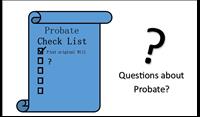
Some people believe that if they have a Will, then no probate is necessary. Quite the opposite is true. Generally, only a properly funded living trust can avoid probate. If there is a Will, the Deceased’s estate will go through a court-managed process called probate.
What is probate? Probate is basically a process where the Will is examined by the court to determine if it is valid under Texas law, to prove up the facts of death, and to appoint an Executor who will manage and distribute the assets under the terms of the Will.
There are many different types of probate. This article discusses the usual form of probate proceeding where there is a Will and no one contests it. But there are other types of probate proceedings to streamline transfer of title to property and also for those individuals who pass away without a Will.
For the standard probate proceeding with a Will, the process involves the following steps:
- Application is filed with proper court requesting admission of Will into probate and requesting appointment of Executor for estate administration.
- Public notice is sent that Applicant (usually Executor named in Will) is seeking to probate Will.
- Short hearing is held in front of judge with Applicant testifying as to facts of death, that Will submitted has not been revoked, and that Applicant is qualified to be Executor.
- After the hearing, Applicant is sworn in as Executor and will receive Letters Testamentary. Letters Testamentary are proof to others the Executor is acting with the authority of the court to handle the estate. With Letters Testamentary, the Executor can sell assets, transfer title to assets, and sign tax returns and other legal documents on behalf of the estate.
- Notice Will admitted to probate and of appointment of Executor is sent to all beneficiaries, enclosing copy of the Will.
- Inventory and appraisal of estate assets is prepared, with copies supplied to all beneficiaries and an affidavit of compliance filed with the court.
- Payment of estate debts to rightful creditors.
- Executor sells assets or retitles assets into names of beneficiaries.
-
Income Tax Return and Estate Tax Return prepared and taxes paid, if applicable.
- Final distribution of assets to beneficiaries.